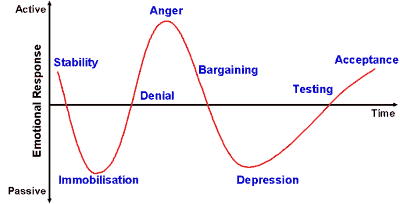 "Life, liberty and the pursuit of happiness" is one of the most famous phrases in the United States Declaration of Independence. It is listed as one of the "unalienable rights" of man.
"Life, liberty and the pursuit of happiness" is one of the most famous phrases in the United States Declaration of Independence. It is listed as one of the "unalienable rights" of man.And yet, true happiness is often elusive and grief and misery fills the void.
Daniel Gilbert, however, in his book "Stumbling on Happiness" cites studies which indicate that most people who endure major traumas (wars, car accidents, rapes) return successfully to how they felt before the bad things happened to them.
Actually, many of them report that they ended up happier than they were before the trauma. It appears as if the human mind is regulated by a thermostat that resets us to our emotional baseline, irrespective of the difficulties we go through.
Partly this miracle is due to the fact that our brain has a merciful ability to forget. The memories, the feelings, the pain; they all slowly fade away until those emotions are no longer at the surface. It doesn't mean they are gone, but simply that they are no more ever present. And that allows us new happiness.
According to Gilbert we are not very imaginative. And we are particularly bad at imagining how we will think or feel in the future. Not only do we not have enough imagination and understanding of ourselves, but we also lack the logical thinking to objectively analyze our past patterns and behaviors and predict how we will react.
This is the reason the things we anticipate will give us joy don't always appear as joyful when they happen, and some of the things we fear turn out not to be as bad as we envisioned. Of course, some really bad things we fear turn out to be terrifying beyond our wildest imagination, if they do happen, but we are mostly able to heal again.
We "expect the next car, the next house or the next promotion to make us happy even though the last ones didn't and even though others keep telling us that the next ones won't."
In fact, we all participate in a giant rat race, thinking we will become happier if we achieve more, which helps society evolve, but as individuals we don't become any more satisfied.
Our basic happiness (or lack thereof) appears to be almost genetically predestined. And any interruptions, such as grief and sadness, go through a predictable healing cycle just like wound healing goes through several physiological stages.
Dr. Elisabeth Kubler-Ross, a Swiss psychiatrist worked with terminally ill patients in the 1960's which resulted in the establishment of a "cycle" that she found each patient went through upon learning of their imminent death. This cycle doesn't just apply to people who are about to die, but the brain reacts the same way to various types of grief and trauma and the Kubler-Ross cycle has been taught to innumerable medical professionals:

The first reaction is shock. The universal first reaction to hearing bad news is, "No."
The second stage is quickly followed by denial. "This can't be happening."
The third stage is anger. This anger may be directed at God, nature, or luck.
The fourth stage is bargaining. The person hopes that God, or a miracle, or forces of nature, or science, will extend their life or salvage the situation.
The fifth stage is grieving. This is usually the longest lasting stage of the cycle and is marked by deep depression and mood changes.
The final stage is acceptance. Once this stage is reached, the person can move on. There is peace and the person can start functioning again, or die in peace, if that was what the grief was about.
In "healthy grieving," and depending on the severity of the situation, this grieving process may take
from weeks to many months and sometimes years. It is a process and every grieving person needs to go through this. There aren't any shortcuts, just like there aren't any shortcuts when we have broken a bone. It needs to heal the way the body does this.
So how can we be happy when at any moment everything we cherish can be taken away from us? The answer is that in a way our lives are a long, ongoing, delusion. David Gilbert asks, "How do we manage to think of ourselves as great drivers, talented lovers and brilliant chefs when the facts of our lives include a pathetic parade of dented cars, disappointed partners and deflated soufflés? The answer is simple: We cook the facts."
We delude ourselves into thinking that we are safe, that the next promotion will make us happy, and that nothing bad will happen. Because if we didn't feel that way, we'd be filled with terror and then we couldn't function.
"If we were to experience the world exactly as it is, we'd be too depressed to get out of bed in the morning," Gilbert writes. "But if we were to experience the world exactly as we want it to be, we'd be too deluded to find our slippers."
Scott Stossel, in his New York Times review of Gilbert's book, writes that "Interestingly, the clinically depressed seem less susceptible to these basic cognitive errors. For instance, healthy people can be deluded into greater happiness when granted the mere illusion of control over their environment; the clinically depressed recognize the illusion for what it is. All in all, it's yet more evidence that unhappy people have the more accurate view of reality -- and that learning how to kid ourselves may be a key to mental health."
So our normal state of happiness may really be a complete delusion. And the fact that people drink to forget their sorrows or pop "mother's little helpers," is just an attempt to regain equilibrium and jump back into the ongoing delusion we're all living in.
Then again, while the pessimist may be right more often, the optimist has a lot more fun. So if given a choice, I'm all for deluding ourselves, be happy, and live a much more satisfying life than any non-delusional pessimist could ever hope for!
No comments:
Post a Comment